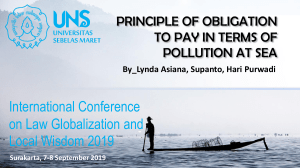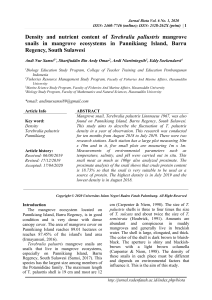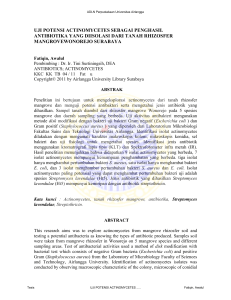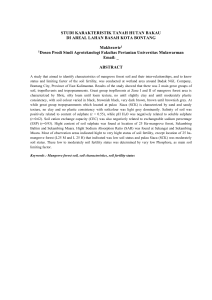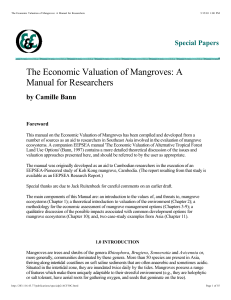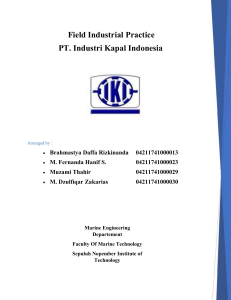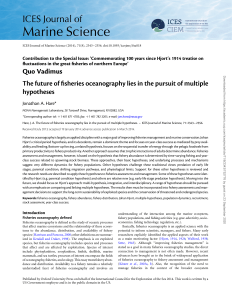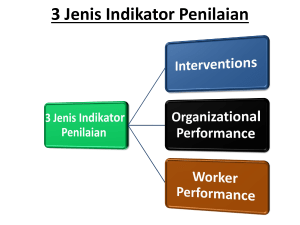Uploaded by
common.user70619
Grant Package VI Term of Reference: Ecosystem Management & Sustainable Livelihoods in Gili Balu
advertisement
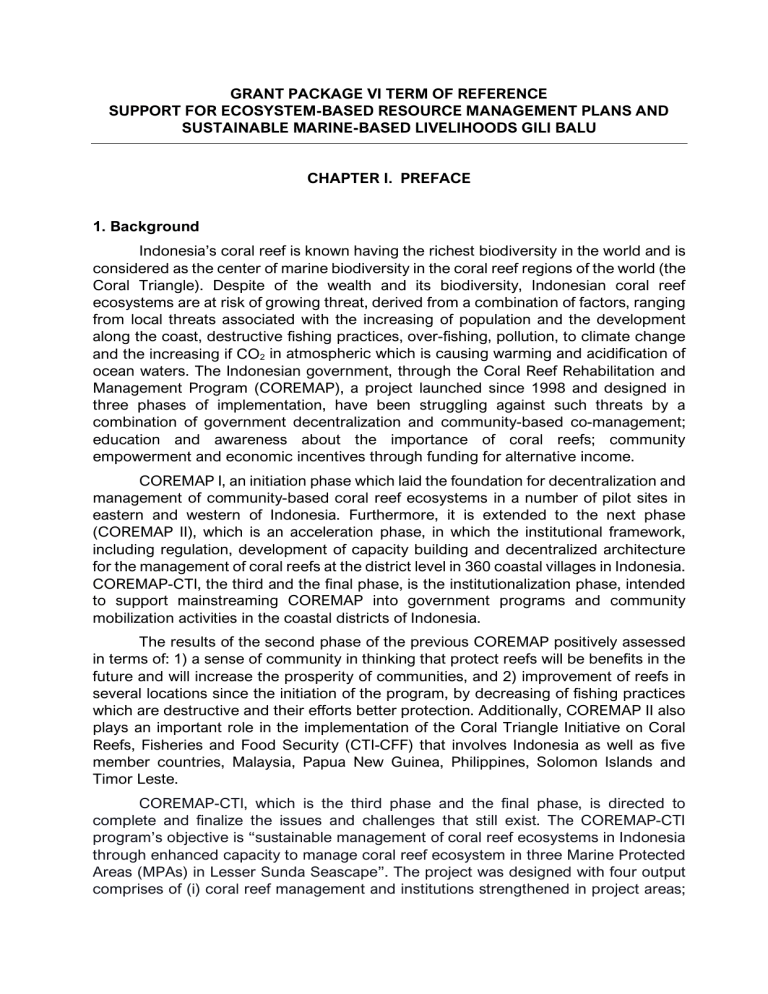
GRANT PACKAGE VI TERM OF REFERENCE SUPPORT FOR ECOSYSTEM-BASED RESOURCE MANAGEMENT PLANS AND SUSTAINABLE MARINE-BASED LIVELIHOODS GILI BALU CHAPTER I. PREFACE 1. Background Indonesia’s coral reef is known having the richest biodiversity in the world and is considered as the center of marine biodiversity in the coral reef regions of the world (the Coral Triangle). Despite of the wealth and its biodiversity, Indonesian coral reef ecosystems are at risk of growing threat, derived from a combination of factors, ranging from local threats associated with the increasing of population and the development along the coast, destructive fishing practices, over-fishing, pollution, to climate change and the increasing if CO2 in atmospheric which is causing warming and acidification of ocean waters. The Indonesian government, through the Coral Reef Rehabilitation and Management Program (COREMAP), a project launched since 1998 and designed in three phases of implementation, have been struggling against such threats by a combination of government decentralization and community-based co-management; education and awareness about the importance of coral reefs; community empowerment and economic incentives through funding for alternative income. COREMAP I, an initiation phase which laid the foundation for decentralization and management of community-based coral reef ecosystems in a number of pilot sites in eastern and western of Indonesia. Furthermore, it is extended to the next phase (COREMAP II), which is an acceleration phase, in which the institutional framework, including regulation, development of capacity building and decentralized architecture for the management of coral reefs at the district level in 360 coastal villages in Indonesia. COREMAP-CTI, the third and the final phase, is the institutionalization phase, intended to support mainstreaming COREMAP into government programs and community mobilization activities in the coastal districts of Indonesia. The results of the second phase of the previous COREMAP positively assessed in terms of: 1) a sense of community in thinking that protect reefs will be benefits in the future and will increase the prosperity of communities, and 2) improvement of reefs in several locations since the initiation of the program, by decreasing of fishing practices which are destructive and their efforts better protection. Additionally, COREMAP II also plays an important role in the implementation of the Coral Triangle Initiative on Coral Reefs, Fisheries and Food Security (CTI-CFF) that involves Indonesia as well as five member countries, Malaysia, Papua New Guinea, Philippines, Solomon Islands and Timor Leste. COREMAP-CTI, which is the third phase and the final phase, is directed to complete and finalize the issues and challenges that still exist. The COREMAP-CTI program’s objective is “sustainable management of coral reef ecosystems in Indonesia through enhanced capacity to manage coral reef ecosystem in three Marine Protected Areas (MPAs) in Lesser Sunda Seascape”. The project was designed with four output comprises of (i) coral reef management and institutions strengthened in project areas; (ii) ecosystem-based resource management plans developed and operational; (iii) sustainable marine-based livelihoods improved; and (iv) project management, monitoring and knowledge transfer. Grant Package 6 (GP. 6) of this project will be implemented Gili Balu Marine Protected Area. The overarching goal of the COREMAP-CTI project under GP 6 is to assist the Gili Balu MPA Management body to achieve an 100% green level of management effectiveness (EKKP3K). Improvement of management effectiveness status will be pursued through the development of ecosystem-based resources management and the promotion of sustainable marine livelihood. Improvement efforts of increase the management effectiveness will be pursued through the following main activities: - Critical habitat rehabilitation such as mangrove restoration in Gili Balu MPA with complimentary support of a cost-benefit analysis including valuation on ecosystem services on the ecosystem rehabilitation. - Small infrastructure development and capacity building for communities to support ecosystem-based resource management and sustainable marine-based livelihoods. Figure 1. Map of the Project Location (Gili Balu MPA) 2. Legal Basis To support the ecosystem-based resource management plans and sustainable marine-based livelihoods in Gili Balu MPA, legal basis which could be synergized and underpin the implementation of activities are: 1. Ministerial Regulation of Marine Affairs and Fisheries no PER.02/MEN/2009 on Determination Procedure of Marine Protected Area. 2. Ministerial Regulation of Marine Affairs and Fisheries no PER.15/MEN/2010 on Organization and Work Procedure Ministry of Marine Affairs and Fisheries. 3. Ministerial Regulation of Marine Affairs and Fisheries no PER.30/MEN/2010 on Management and Zonation Plan of Marine Protected Area 4. Director General Decree (KEPDIRJEN) of Marine, Coastal, and Small Islands No. 44/KP3K/2012, on approval of the release of the E-KKP3K book regarding evaluation and effectiveness of the management of marine protected areas, coastal areas, and small islands. 5. West Nusa Tenggara Governor Decree No. 523.1-972/2016 on Management Plan and zoning of Marine Conservation Areas, Coastal and Small Islands in West Nusa Tenggara Province. 3. Challenges/Issues Several challenges/issues and opportunities in the management of Gili Balu MPA are: 1. Environmental degradation due to destructive fishing activities. 2. The emerging tourism from Liveaboard-based tourism 3. The potential development of a tuna fishery improvement program and its benefit for the community livelihood. 4. Unsustainable practices of marine resource utilization and lack of support to improve surveillance activities 4. Purpose and Objectives The purpose of package #6 “Support for Ecosystem-based resource management plans and Sustainable marine-based livelihoods in Gili Balu” is to support the management effectiveness of Gili Balu MPA to reach 100% green. The grant package #6 will focus on some objectives that relate to the implementation of ecosystem-based resource management plans and the effort of strengthening community livelihood based on sustainable use of tuna fishery as well as the improvement of the mangrove ecosystem as well as its quality. The specific activities of grant package #6 are to: 1. Support the MPA management body and local community groups on the development of mangrove rehabilitation and restoration plan. 2. Conduct community-based mangrove rehabilitation/restoration, including site selection, baseline and completion surveys. 3. Provide an empirical assessment in the form of cost benefit analysis including valuation of ecosystem services of mangrove rehabilitation in Gili Balu MPA. 4. Support the initiation of the tuna fisheries improvement program and the community- based livelihood. 5. Maintain coordination with local government authorities during the project implementation. 6. Conduct community awareness and public campaigns on MPA law enforcement, Marine Conservation Area (MCA), and endangered, threatened, and protected (ETP) species in Gili Balu MPA. 7. Conduct capacity building on MPA law enforcement to the community as well as related stakeholders to strengthen surveillance activities. 8. Implementation of surveillance scheme through establishment of surveillance post and/or other relevant infrastructures and provide operational support to strengthen community surveillance activities. 9. Develop lessons learned and best practices of the project implementation. 5. Scope of Project The scope of project on Package #6 should cover any activities and deliverables that include but not limited to: 1. Mangrove Rehabilitation (MR). The MR is intended to restore and rehabilitate at least 20% of degraded mangrove ecosystem areas through appropriate methods and baseline data. To implement the community MR, the consultant is expected to conduct the following activities and other activities that might be relevant to achieve the output such as: - Series of surveys to identify target locations for mangrove rehabilitation sites, and establish the baseline and completion survey data. The consultant is expected to consult with the community and management authority to select the priority target areas. - Implementation of coordination meetings with other related stakeholders to formulate appropriate methods to restore/rehabilitate mangrove ecosystems in the target areas. - Development of mangrove restoration, monitoring and maintenance plan in the target areas. - Preparation of infrastructure and materials for the mangrove rehabilitation and restoration activities according to the agreed methods. - Implementation of mangrove restoration and monitoring as well as maintenance during the project period. 2. Provide an empirical assessment of the mangrove rehabilitation in Gili Balu. The consultant is expected to provide an empirical assessment in the form of costbenefit including valuation of ecosystem services of the mangrove rehabilitation in Gili Balu. The consultant will conduct primary and secondary data collection through field survey (if needed) and coordination meeting with the local community, MPA management body, and related stakeholders. Technical reports and dissemination of findings should be delivered to the management authority and related stakeholders and be completed during the project period. 3. Support the initiation of the tuna fisheries improvement program and the community-based livelihood. The consultant will initiate the fisheries improvement program through the initiation and formulation of harvesting strategy/management tool on tuna fishery in the Gili Balu MPA and its adjacent waters. The consultant is expected to conduct primary and secondary data collection and coordination with local government, communities, MPA management body, and other related stakeholders during the project period. The consultant will provide eco-friendly fishing gear or other equipment to promote sustainable fishing and workshop related to sustainable use of fisheries resources. Also, the project will support livelihood improvement for 3 community-based enterprises. The consultant is expected to deliver a series of capacity building and technical assistance to the community on appropriate techniques of post-harvest process, packaging, and marketing of sea-food based products. The consultant is expected to conduct several activities that include but not limited to: - The implementation of public consultation, focus group discussion (FGD) and coordination meeting with local government, national government and related stakeholders to formulate the good practices of tuna fishery and its post-harvest strategy - Conduct capacity building on processing, packaging, and marketing includes the acquirement of Perizinan Pangan Industri Rumah Tangga (PIRT) certificate and Halal certificate. - Provide sustainable fishing gears as well as processing and packaging equipment of the tuna fishery to the selected community-based enterprises. The selection of the community-based enterprises is based on identification in the site through discussion with community, head of village and district office. The selection criteria will be developed by the consultant/NGO based on the discussion and local condition - Capacity building for communities on the utilization of sustainable fishing gears, and knowledge sharing, reporting and evaluation. 4. Maintain coordination with local government authorities during the project implementation. 5. Conduct community awareness and public campaigns on MPA law enforcement, and ETP species in Gili Balu MPA. 6. Training on community-based surveillance (at least 40 persons) shall be delivered after the group's assessments and registration are completed. The training is intended to provide a capacity building to the local communities, MPA management body, sub-national and national staff and other related stakeholders on MPA law enforcement. The project’s gender action plan to be applied. The training materials should be relevant and standardized based on the fisheries law and regulation to prevent illegal and destructive fishing, unreported, and unregulated fishing and ensure the compliance of MPA management and zoning plan. The activities should include but not limited to: - Identification of training target participants - Preparation of curriculum and training materials based on national guidelines - Implementation of training, evaluation of training effectiveness, and reporting 7. Implementation of surveillance scheme through establishment of surveillance post and/or other relevant infrastructures and its supporting equipment and operational support as well as capacity building to strengthen surveillance activities. The project gender plan to be applied. To strengthen community surveillance groups in Gili Balu MPA, the consultant will established surveillance post, procure surveillance boats, and surveillance equipment for the community groups. Also, the consultant will provide operational support for a routine community group patrol. The establishment of a surveillance post should comply with ADB procurement guidelines (2017, amended from time to time) and environmental and social safeguards. If land is needed to be acquired, it has to comply with ADB safeguards principle (Safeguards Policy Statement 2009). The consultant will assess the status of the community groups and conduct due diligence and a need assessment survey before the procurement is performed and Berita Acara Penitipan is completed according to the Indonesian regulation. 8. Develop lessons learned and best practices of the project implementation 9. Develop the project health and safety plan in response to the pandemic of corona virus disease (COVID-19). 10. For the health and safety reasons, consultants should follow the regulations and guidance on COVID-19 health and safety prevention and controls issued by the government, or international good practices in the absence of national provisions. 11. The consultant is responsible for their own health and safety in relation to the consulting services assignment and shall comply with the country specific requirements and regulations in relation to COVID-19. 6. Output The specific output of the Package #6, which at least contains but not limited to: 1. Restoration and rehabilitation of least 20% of degraded areas on mangrove through appropriate methods and baseline data. In addition, the consultant is expected to provide a technical report on mangrove restoration, baseline and completion data, and cost-benefit analysis. 2. Technical report on mangrove restoration/rehabilitation and its appropriate rehabilitation method and target location, including discussion results in the formulation of cost-benefit analysis of mangrove rehabilitation in Gili Balu. 3. Technical report on cost benefit analysis including valuation of ecosystem services of mangrove restoration. 4. Initiation of tuna fisheries improvement program to support community livelihood for at least 3 community enterprise groups in Gili Balu through the improvement of seafood-based processing and marketing (processing, packaging as well as food certification). Ensure at least 30% women are supported with the livelihood assistance. 5. Surveillance training is delivered to at least 40 appropriate for surveillance group, management body, and related stakeholders as well as operational support for community surveillance. Ensure at least 30% women participation in training. 6. Coordination with the local government authorities during the project implementation is maintained. 7. Procurement of boats and appropriate equipment as well as operational support for routine patrol conducted by the community group. 8. Media campaign report on MPA law enforcement, MCA, and ETP species. Ensure at least 30% women participation in public awareness activities. 9. Surveillance scheme implemented and Surveillance post and/or other relevant infrastructures established and properly equipped for operational in designated location. 10. Document of lesson learned and best practices during the project implementation. CHAPTER II. METHODOLOGY Package #6 contains several activities that include but not limited to the procurement of experts, mangrove restoration efforts, capacity building for community surveillance groups as well as the development of community-based enterprise groups, surveys and meeting coordination to support above outputs. Activities of collecting communities’ information and dissemination of law documents (law enforcement) will be conducted participatory involving all of the stakeholders, in coordination with the provincial government agencies, Ministry of Marine Affairs and Fisheries (MMAF), through a series of Workshops and FGD taking into account the gender equality of participants. 1. Current conditions The management effectiveness of Gili Balu according to the current EKKP3K assessment is at 81% green level. Gili Balu MPA is lacking on several SOPs related to ecotourism management, surveillance, fisheries and implementation of surveillance effort. 2. Expected Outcomes By the end of COREMAP-CTI ADB project implementation, we envision that Gili Balu will achieve 100% Green Level of management effectiveness and restore/rehabilitate 20% of degraded areas of mangrove This overarching goal is supported direct and indirect through the completion of outputs in Grant Package #6. CHAPTER III. COMPOSITION AND QUALIFICATION OF SPECIALISTS The consultant should have experience in working with MPA Management Body in Indonesia. The consultant will be an institution and registered under Indonesian law. It is preferred that the consultant holds a familiarity to work with the Ministry of Marine Affairs and Fishery (MMAF), Provincial Government, community, and private sector stakeholders. Also, the consultant should have adequate knowledge in the field of conservation and community development. To deliver the outputs and handle the activities in the scope of works, these are the following required qualifications for the specialist: 1. Project Coordinator (PC)- 22 person-months (pm)/ Time Based • Prepare annual work plan and budget which will be reviewed by I C C T F • Planning and scheduling of project activities • supervision and monitoring of the work program of the entire Project and preparation monitoring reports • PC will lead the project implementation and ensure the quality of deliverables by the experts (MBS, MRE, ESS, DED-C, HSE, PHME, PMS and FAO) during the project implementation at the site level. The PC’s responsibility includes the supervision of procurement of goods. • The PC’s responsibility includes the supervision of light infrastructure development (surveillance post) in Gili Balu MPA. It is expected that the surveillance post’s DED are simple and easy to understand by the community. • PC will coordinate with ICCTF site coordinator in maintaining communication with local communities and related stakeholders. PC to work closely with the provincial government related agencies for MPA management, district government, and also MMAF. • Lead the implementation of the project Gender Action Plan, and also conducting the environmental and social safeguards and indigenous people screening in all project activities. • Prepare and supervise the implementation of project health and safety plan in response to Covid-19. • PC will maintain project calendar and milestones to be achieved by the experts • PC will facilitate the flow of essential information among expert members • PC will Identify trends and shifts in project implementation to inform changes or adjustments to overall project design • Preparation of quarterly progress reports; midterm project evaluation report and the overall project completion report • PC should have education background in Master (S2) of Marine Biology, Marine Ecology, Marine Conservation, marine science, fisheries, development studies, public policy and/or other relevant fields in environmental and natural resources management with 3 (three) years relevant working experiences or minimum Bachelor Degree (S1) in Marine Biology, Marine Ecology, Marine Conservation, marine science, fisheries, and/or other relevant fields in environmental and natural resources management with 5 (five) years relevant working experiences 2. Marine Biology Specialist (MBS) – (Output Based) • MBS will be responsible to identify the degraded area of mangrove • MBS will work closely with MRE to develop the appropriate techniques on mangrove rehabilitation/restoration. • MBS will work closely with MRE to develop technical report on restoration sites of mangrove and coral reef. MBS should be a consultant with an education background in Master (S2) of Marine Biology, Conservation Biology, Fisheries Management and/or other relevant fields in environmental and natural resources management with 3 (three) years relevant working experience or minimum Bachelor Degree (S1) in Marine Biology, Conservation Biology, Fisheries Management and/or other relevant fields in environmental and natural resources management with 5 (five) years relevant working experiences. • Deliverable of MBS as follow: Year No Deliverable 2020 2021 2022 Q3 Q4 Q1 Q2 Q3 Q4 Q1 Q2 Q3 Marine Biology Specialist 1 Progress report in survey identification for mangrove sites, including the baseline survey and data 2 Draft technical report on restoration sites of mangrove 3 The final technical report on site identification of mangrove rehabilitation 4 Progress report on mangrove rehabilitation 5 The completion report of the mangrove restoration, including the project completion survey 3. Mangrove Restoration Expert (MRE) – (Output Based) • MRE will work closely with MBS to develop the appropriate techniques on mangrove rehabilitation/restoration. • Leading the process of Focus Group Discussion (FGD) and coordination meeting concerning identification area to restore as well as appropriate method to rehabilitate mangrove. • MRE will be responsible for managing restoration operations, monitoring efforts, and facility maintenance. • Conduct mangrove surveys at the project start (baseline) and project completion. • Develop a technical report, best practices and lessons learnt for further scale up and expansion. • MRE should be a consultant with a minimum education background in Master (S2) of Marine Biology, conservation biology, Mangrove Management and/or other relevant fields in environmental and natural resources management with 3 (three) years relevant working experiences or Bachelor Degree (S1) in Marine Biology, conservation biology, Mangrove Management and/or other relevant fields in environmental and natural resources management with 5 (five) years relevant working experiences. • Deliverable of MRE as follow: Year No Deliverable 2020 2021 2022 Q3 Q4 Q1 Q2 Q3 Q4 Q1 Q2 Q3 Marine Biology Specialist 1 Progress report in survey identification for mangrove sites, including the baseline survey and data 2 Draft technical report on restoration sites of mangrove 3 The final technical report on site identification of mangrove rehabilitation 4 Progress report on mangrove rehabilitation 5 The completion report of the mangrove restoration, including the project completion survey 4. Enviromental Economic Spesialist (EES) – (Output Based) • EES will coordinate the implementation of all activities, coordinate the work of experts’ team, and will be responsible for cost benefit analysis including valuation of ecosystem services of mangrove restoration. EES also to work closely with the provincial government and related agencies. • Leading the process of Focus Group Discussion (FGD) and coordination meeting concerning the development of technical report of cost benefit analysis including valuation of ecosystem services of mangrove restoration. EES will collect both of primary and secondary data, process, analyze, and present data and information related to the study and estimated the costs and benefits of mangrove restoration/rehabilitation • EES will assist the project to analysis all the financial cost and benefit analysis including valuation of ecosystem services of mangrove restoration as well as the potential benefit that emerged by the growing of mangrove. • EES should have an education background in Master Degree (S2) of environmental economics, resource management, environmental science and/or other relevant fields in environmental and natural resources management with minimum 3 (three) years relevant working experiences, or Bachelor Degree (S1) of environmental economics or other relevant fields in environmental and natural resources management with minimum of 5 (five) years relevant working experiences. • Deliverable of EES as follow: Year No Deliverable 2020 2021 2022 Q3 Q4 Q1 Q2 Q3 Q4 Q1 Q2 Q3 Enviromental Economic Spesialist 1 Detailed plan on the cost benefit analysis including valuation of ecosystem services of mangrove rehabilitation 2 Progress report of data collection and analysis 3 Draft report on cost benefit analysis including valuation of ecosystem services of mangrove rehabilitation 4 Final report on cost benefit analysis including valuation of ecosystem services of the mangrove rehabilitation 5. Fisheries Specialist (FS)– (Output Based) • FS will work closely with PHME on implementation of the good practices of harvest strategy on tuna fishery and develop harvest strategy document • FS will lead consultations with government and communities to inform (i) the good harvest strategy, considering management of bycatch and also the stock status; • FS should have an education background in Master (S2) of Marine Biology, conservation biology, Fishery Management and/or other relevant fields in fisheries sector with a minimum experience 3 (three) years or Bachelor Degree in Marine Biology, conservation biology, Fishery Management and/or other relevant fields in fisheries sector with a minimum experience 5 (five) years. • Deliverable of FS as follow: Year No Deliverable 2020 2021 2022 Q3 Q4 Q1 Q2 Q3 Q4 Q1 Q2 Q3 Fisheries Specialist 1 The draft of business plan and marketing strategy of seafood product including tuna fishery 2 Progress report on community training 3 The completion business plan and marketing strategy of seafood product including tuna fishery 6. Post Harvest Management Expert for tuna (PHME) – (Output Based) • PHME will work closely with FS on implementation of the good practices of postharvest on seafood product • PHME will work closely with FS to ensure the good quality of the final product and develop a framework of seafood business management and marketing • PHME will leading consultations with government and communities concerning to (i) post-harvest technique; (ii) marketing strategy of tuna processing product • PHME should have an education background in Master (S2) of Marine Economics, Business Management and Marketing, Food Processing, Marine Biology and/or other relevant fields in sustainable livelihood with a minimum experience 3 (three) years or minimum Bachelor Degree (S1) in Marine Economics, Business Management, Food Processing, Marine Biology and/or other relevant fields in sustainable livelihood with a minimum experience 5 (five) years. • Deliverable of PHME as follow: Year No Deliverable 2020 2021 2022 Q3 Q4 Q1 Q2 Q3 Q4 Q1 Q2 Q3 Post Harvest Management Expert for tuna 1 The draft of business plan and marketing strategy of seafood product including tuna fishery 2 Progress report on community training Year No Deliverable 2020 2021 2022 Q3 Q4 Q1 Q2 Q3 Q4 Q1 Q2 Q3 3 The completion business plan and marketing strategy of seafood product including tuna fishery 7. Detail Engineering Design consultant (DED consultant) – (Output Based) • The DED consultant will undertake works that include but not limited to environmental and site planning as well as construction planning, which comprise of the following tasks: i. The DED Consultant shall be able to cooperate and work closely with the local community, local government and MPA to obtain inputs and suggestions used to synthesize in making decisions. ii. Develop the construction plan; and iii. Produce the detail engineering design at least consisting of technical drawing, bill of quantity and cost estimate for the construction. • The DED consultant should be a consultant with a minimum education background in bachelor (S1) in architecture, civil Engineering with a 5 (years) years minimum experience. • Deliverable of DED consultant as follow: Year No Deliverable 2020 2021 2022 Q3 Q4 Q1 Q2 Q3 Q4 Q1 Q2 Q3 DED consultant 1 The final DED including the bill of quantity, technical drawing, cost estimate of surveillance post and/or other relevant infrastructure 8. Finance and Admin Officer (FAO) – 22 pm/ Time Based • FAO will ensure the proper management and control of financial and management in compliance with ICCTF and donor standards Operating Procedure; • FAO will prepare all procurement and financial requests, activities, and documentation related to the project implementation; taking corrective actions as needed and reporting any unusual activities concerning the financial disbursement • FAO provides advice and recommends solutions to a wide range of financial issues to Project Implementation. • FAO will prepare the necessary documentation related and support the entire project implementation and follow-up on donor reports schedule as per agreement to ensure timely reporting • FAO should be a consultant with a minimum education background in bachelor (S1) in Finance, Accounting, Business Administration and/or other relevant fields in administration or finance with a 2 (years) years minimum experience. CHAPTER IV. WORK COMPLETION AND ASSIGNMENT SCHEDULE OF EXPERTS The period of project completion is 22 months (since the contract signing up to September 30th, 2022) with activities, however, the work plan and the timeline below are indicative and to be finalized during the contract negotiation based on the latest restrictions caused by COVID-19 or any other safety issues. Year No Activities 2020 Q3 A Support the MPA management body and local community groups on the coral reef and mangrove rehabilitation and restoration. 1 Coordination meeting Identification for mangroves sites in Gili Balu 2 Coordination meeting with stakeholder in Gili Balu 3 Training on appropriate method to restore and rehabilitate mangrove in Gili Balu 4 Coordination meeting with local community to discuss mangrove rehabilitation in Gili Balu 5 Survey identification for mangrove in Gili Balu 6 Survey for sea-based identification in Gili Balu 7 Mangrove Rehabilitation (Mangrove seed and Community Work for plant and maintain mangrove) B Provide an empirical assessment of the coral reef and mangrove rehabilitation in Gili Balu. 8 FGD and seminar Cost benefit analysis on mangrove in Gili Balu 9 Survey Cost Benefit Analysis on mangrove Gili Balu Q4 2021 Q1 Q2 Q3 2022 Q4 Q1 Q2 Q3 Year No Activities 2020 Q3 C Establish light infrastructures. 10 Build two surveillance post and/or other relevant infrastructure D Provide capacity building and supports to the community surveillance group in Gili Balu to improve compliance in resource use utilization. Training for community, community surveillance group, 11 management body and related stakeholders on MPA law enforcement in Gili Balu 12 Community based surveillance training and dive training 13 Community meeting to support surveillance group Gili Balu 14 Conduct community surveillance patrol Procure equipment for surveillance post (Communication equipment, GPS, chair, table, filling cabinet, Navigation Map, white 15 board, compass bidik, megaphone, GPS, toolkit box, binocular, marine radio transceiver) 16 Procurement of 1-unit surveillance boat for 2 POKMAS Procure equipment to support community surveillance group 17 activities in Gili Balu (Uniform, handy talky, flashlight, life jacket, shoes) E Provide capacity building and technical assistance to the community groups in Gili Balu on tuna fishery, small scale processing product, and marketing to improve the community livelihood. 18 FGD for harvest strategy formulation Q4 2021 Q1 Q2 Q3 2022 Q4 Q1 Q2 Q3 Year No Activities 2020 Q3 19 FGD for best practice exchange learning in Gili Balu Tuna Fisheries site 20 Dissemination of harvest strategy for Tuna Fisheries 21 Capacity Building and training to use sustainable fishing gear for community 22 Training post-harvest improvement of tuna 23 Training on tuna business management and marketing 24 Support for tuna food certification (PIRT, HALAL) 25 Training on packaging improvement for community 26 Training on marketing knowledge for community 27 Community survey for site identification/ potential landing site Gili Balu 28 Procure small scale fishing equipment (fishing net, hook, cool box) 29 Procure tuna processing equipment (Cold storage, Tuna processing equipment) 30 Procure packaging equipment (seal, wrap, plastic, freezer) F Maintain the coordination with local government authorities during the project implementation and promote lessons learned, best practices and learning exchange during the project implementation 31 Coordination meeting with stakeholder consolidate annual project with RPJMD/RPJMN Q4 2021 Q1 Q2 Q3 2022 Q4 Q1 Q2 Q3 Year No Activities 2020 Q3 32 FGD for best practice exchange learning in Gili Balu tuna fisheries site G Conduct community awareness and public campaigns on MPA law enforcement, MCA, and ETP species in Gili Balu. 33 Community awareness and public campaign on MPA law enforcement, MCA, and ETP species in Gili Balu 34 Media campaign on TV and newspaper in Gili Balu H Reporting 35 Inception Report 36 Progress Report 1 (PR1) 37 Progress Report 2 (PR2) 38 Progress Report 3 (PR3) 39 Final Completion Report Q4 2021 Q1 Q2 Q3 2022 Q4 Q1 Q2 Q3 Assignment schedule of specialist and supporting staff as in the following table: Year No Specialist/Supporting Staff 2020 Q3 1 Q4 2021 Q1 Q2 Q3 2022 Q4 Q1 Q2 Q3 Project Coordinator: 22 months (time based) 2 Marine Biology Specialist: 12 months (output based) 3 Mangrove Restoration Expert: 12 months (output based) 4 Environmental Economic Specialist: 12 months (output based) 5 Tuna Fisheries Specialist: 12 months (output based) 6 Post-harvest Management Expert for tuna: 12 months (output based) 7 DED Consultant 8 Finance and Admin Officer: 22 months (time based) Note: p-m : person-month Specialist or supporting staff will work after the signing of the contract with the number of work months as specified in the table above. CHAPTER V. REPORTING AND DELIVERABLES The consultant will be hired under CQS (Consultant’s Qualifications Selection) method and the contract type will be partial lump sum (lumpsum/output based and at cost). Lumpsum payment will be applied for the remuneration and out of pocket expenses, while at cost payment will be applied to the provisional sum. The consultant has an obligation to report the progress of the work completion as follows: 1. Inception Report The Inception Report comprises - Acknowledgment of Term of Reference, - Methodology, - Schedule, - Implementation arrangement of works including an exposure to collect input and thoughts from ICCTF and Directorate of Marine and Fisheries, National Development Planning Agency (Bappenas), as well as other stakeholders - Stakeholder analysis, and - Workplan The Inception report should be submitted in both Bahasa and English to ICCTF no later than the third week of the first month after the notice to proceed/ Surat Perintah Mulai Kerja (SPMK) is issued (2020). 2. Progress Report 1 (PR1) The report comprises of: - The final DED of surveillance post (construction plan, technical drawing, bill of quantity and cost estimate for the construction) - Progress report to identify the target areas of restoration/rehabilitation, including baseline survey and data. mangrove - Progress report on the appropriate method of mangrove restoration - Draft lesson learned and best practices - Financial Report (disbursement and expenditures) The Progress Report 1 should be submitted in both Bahasa and English to ICCTF no later than the second week of Q1 in 2021. 3. Progress Report 2 (PR2) The PR2 should contains - Progress report of the surveillance post and/or other relevant infrastructures establishment, - Progress report of the coral reef restoration, - Progress report of cost benefit analysis including valuation of ecosystem services of mangrove rehabilitation, - The draft of business plan and marketing strategy of seafood product including Tuna - Final publication material product from lesson learned and best practices documentation - Financial Report (disbursement and expenditures) The Progress Report 2 should be submitted in both Bahasa and English to ICCTF no later than the end of Q3 in 2021. 4. Progress Report 3 (PR3) The progress Report 3 includes the - The completion report of mangrove restoration, including the project completion survey - The completion report of the cost benefit analysis including valuation of ecosystem services of mangrove rehabilitation - The completion business plan and marketing strategy of seafood product including tuna fishery - The final report of media campaign and media products delivered - The completion report of all FGDs and - The completion report of all training to the communities and evaluation. - The completion report of infrastructures establishment - Financial Report (disbursement and expenditures) The Progress Report 3 should be submitted in both Bahasa and English to ICCTF no later than the end of Q1 in 2022. 5. Final Completion Report The final report must be submitted at the latest one month after the project has been completed, at the end of June 2022. The report must be approved by the ICCTF before the final disbursement will be paid out. The completion report should include the highlights of all milestones, achievements, Project Financial Report, Project Lesson Learn Report, and all project documentation. Jakarta, 26 Agustus 2020 Pejabat Pembuat Komitmen (PPK) Program PPN XIV MWA Dana Perwalian Perubahan Iklim Indonesia (ICCTF) Dedi Rustandi, ST, M.En 19771116 200912 1 002
